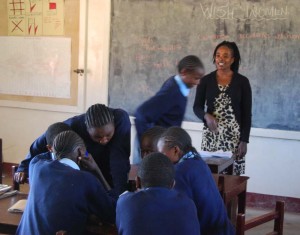Daraja’s most senior class spent time in their WISH lesson last week talking about our responsibility to some of the most important people in our lives – our older family members and the elderly in our communities. WISH – Women of Integrity, Strength and Hope – is a class that helps the students gain a stronger overall view of their responsibilities as educated women to their families and communities. “We are WISH ladies,” said Victoria, one of Daraja’s teachers. “We want to focus on the elderly because they are very important people in our society.”
The students gave examples of what makes the elderly population more vulnerable, including health issues and stress, while also discussing the importance of the older generations in their lives. Victoria encouraged the girls to take an active role in the lives of the elderly in their families and communities. “That’s the way you’re going to tell God to bless us when we are that age,” she said.

“By being near them when they are lonely.” – Faith
“Respect them, understand them, and show them love.” – Mary K.
In Kenya, grandmothers (and older women in the community) are called Shush. At the end of the lesson, Victoria gave the Form 3 students an assignment – “Go home and tell your Shush: ‘Shush, if you’re this beautiful today, how beautiful were you when you were a girl?’” She explained that just a small amount of positive attention will go a long way in Shush’s life and make her happy. “She will tell you, ‘You should’ve seen me when I was young… that’s when I met your grandfather!’” The girls, sitting shoulder to shoulder in the classroom, burst out laughing.
Victoria encouraged the girls to take care of their family members now, and when they are working and earning an income. But, she warned, “There is a difference between your money giving Shush that care and you giving her that care.” The girls agreed that it was important to do that work themselves.
This week, the Form 3 students talked about common injuries around the house – scalds, burns and cuts – how to prevent them and how to treat them. Some of the girls’ suggestions for prevention were to keep children away from hot objects, turn off lamps when not in use, keep sharp objects out of children’s reach and to dispose of broken glass properly.
Teacher Carol emphasized the importance of this topic by reminding the girls that “One day something might happen to your child or to your Shush. As a WISH woman, what will you do to manage?” The girls demonstrated how to handle small or severe burns, and shallow and deep wounds.
Jacinta, Daraja’s nurse, was the last to speak, giving the girls more advice on using direct pressure on cuts, using cold water or ice on burns, and how to handle a chemical burn or chemical inhalation in the lab.
